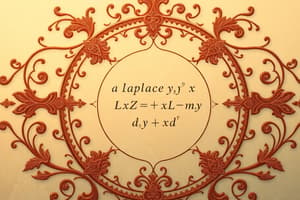Podcast
Questions and Answers
ما هي المعادلة التي يتم استخدامها لتمثيل معادلة لابلاس في منطقة مستطيلة في السطح (x، y)؟
ما هي المعادلة التي يتم استخدامها لتمثيل معادلة لابلاس في منطقة مستطيلة في السطح (x، y)؟
معادلة لابلاس: $Δu(x, y) = 0$
ما نوع الحل الذي يفترضه النص لمعادلة لابلاس؟
ما نوع الحل الذي يفترضه النص لمعادلة لابلاس؟
النص يفترض حلاً من الشكل: $u(x, y) = X(x)Y(y)$
ما هي النتيجة عند استبدال الحل المفترض في معادلة لابلاس؟
ما هي النتيجة عند استبدال الحل المفترض في معادلة لابلاس؟
تؤدي إلى معادلتين تفاضليتين عادتيتين مرتبطتين في المتغيرات X و Y.
ما الذي تمثله الحلول لهذه المعادلات التفاضلية المرتبطة؟
ما الذي تمثله الحلول لهذه المعادلات التفاضلية المرتبطة؟
في أي مجالات من العلوم والهندسة يجد تطبيق معادلة لابلاس؟
في أي مجالات من العلوم والهندسة يجد تطبيق معادلة لابلاس؟
ما هي الامتدادات الممكنة لمعادلة لابلاس التي تسمح بنمذجة أنظمة أكثر تعقيدًا؟
ما هي الامتدادات الممكنة لمعادلة لابلاس التي تسمح بنمذجة أنظمة أكثر تعقيدًا؟
.
.
.
.
Flashcards are hidden until you start studying
Study Notes
Partial Differential Equations: An Overview
Partial differential equations (PDEs) are mathematical expressions that describe how a certain quantity changes over time and space. They are widely used in various fields such as physics, engineering, economics, and finance to model complex phenomena involving multiple interacting factors.
One fundamental type of PDE is Laplace's equation, which is a second-order linear homogeneous PDE. This equation arises from the study of potential theory and has applications in diverse areas like electrostatics, gravitation, fluid dynamics, quantum mechanics, and even cryptography.
Laplace's Equation
In Cartesian coordinates, Laplace's equation is expressed as:
[ Δf = \frac{\partial^2 f}{\partial x^2} + \frac{\partial^2 f}{\partial y^2} + \frac{\partial^2 f}{\partial z^2} = 0 ]
This equation involves finding a function f whose second partial derivatives with respect to the spatial dimensions x, y, and z sum to zero.
Separation of Variables
To solve Laplace's equation, mathematicians often use the method of separation of variables. This approach allows us to break down the equation into simpler, ordinary differential equations (ODEs) that can be solved separately. By assuming a solution of the form:
[ u(x, y) = X(x)Y(y) ]
where X and Y are both functions of their respective variables, we can substitute this assumed form into the Laplace equation and obtain a system of uncoupled ODEs. These ODEs can then be solved independently, leading to solutions in the form of products of functions of individual variables.
Example: Domain (x, y) Plane
Consider Laplace's equation for a rectangular region in the (x, y) plane:
[ Δu(x, y) = 0 ]
Assuming a solution of the form:
[ u(x, y) = X(x)Y(y) ]
Substituting this into the Laplace equation leads to:
[ \frac{d^2 X}{dx^2} + \lambda \frac{X}{X} = 0 ] and [ \frac{d^2 Y}{dy^2} + \lambda \frac{Y}{Y} = 0 ]
These are two coupled ODEs in the variables X and Y. Their solutions will give us the eigenfunctions and eigenvalues associated with the Laplace operator.
Applications and Extensions
Laplace's equation finds applications in many areas of science and engineering, including electromagnetism, fluid flow, and quantum mechanics. Additionally, there are extensions of Laplace's equation to curved surfaces and higher dimensions, which allow for modeling more complex systems.
For example, in general relativity, the Einstein field equations are a set of nonlinear PDEs that describe the evolution of spacetime itself. These equations can be seen as extensions of Laplace's equation in the sense that they relate the curvature of spacetime to the distribution of matter and energy within it.
Studying That Suits You
Use AI to generate personalized quizzes and flashcards to suit your learning preferences.





